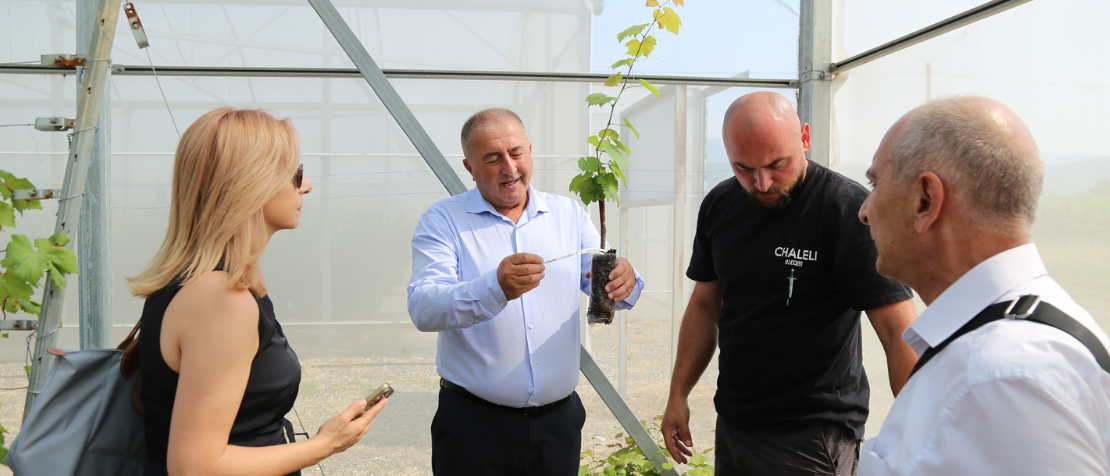Armenia and Georgia enhance collaboration on grapevine nurseries and digital vineyard data systems

©Mariam Khakhashvili
With thousands of years of winemaking heritage deeply rooted in their soil, Armenia and Georgia stand among the world’s oldest wine-producing countries. Their ancient traditions, combined with modern viticulture techniques, create a unique fusion of history and innovation that continues to shape both the regional and global wine landscapes.
Recognizing the vital importance of preserving this cultural and agricultural legacy, the Food and Agriculture Organization of the United Nations (FAO) has been actively supporting sustainable viticulture efforts in both countries. Building on this commitment, FAO Armenia and FAO Georgia joined forces to organize a study tour for the key players in advancing Armenia’s wine sector.
This study tour, organized under the project “Digital Technologies in Support of Agriculture Value Chains and Rural Development,” focused on two key priorities for Armenia: the establishment of certified grapevine nurseries and the effective rollout of the Vineyard Register System (VRS)—a national digital platform designed to enhance vineyard oversight, certification, and planning.
This activity was initiated by FAO Director-General QU Dongyu after his visit to Armenia in 2024, during which he highlighted the importance of regional knowledge-sharing and scientific cooperation among countries with shared agricultural assets.
This visit built on years of groundwork laid by FAO to support Armenia’s viticulture sector. In 2017, a demonstration vineyard was established in the Armavir region with FAO support and later transferred to the Vine and Wine Foundation of Armenia. Today, the site continues to serve as a national resource for research, training, and promotion of sustainable vineyard practices.
Currently, FAO continues to support the Foundation in one of its strategic priorities — developing a unified electronic information system to ensure full traceability and quality control throughout the wine production process. This innovative system will enable precise tracking of vineyard data, grape production volumes, and varietal origins, leading to enhanced transparency and higher sector standards.
FAO Regional Programme Leader for Europe and Central Asia, and FAO Representative in Armenia and Georgia, Raimund Jehle, referred to this opportunity for knowledge and information exchange as a valuable platform for fostering regional collaboration, enhancing capacity, and promoting sustainable agricultural development across both countries. “This study tour highlights the power of regional cooperation in driving agricultural innovation. By sharing knowledge and practical solutions, Armenia and Georgia are laying the foundation for more resilient, modern, and inclusive agrifood systems that can benefit rural communities and strengthen their wine sectors for the future” Jehle said.
The study tour to Georgia, held in Tbilisi and the Kakheti region—widely recognized as the heart of Georgian winemaking—brought together a diverse group of Armenian experts and officials. Participants included representatives from the Ministry of Economy’s Departments of Plant Breeding and Agro-processing, senior staff from the Vine and Wine Foundation of Armenia, and a senior economist from FAO. Over two days, the delegation engaged in targeted meetings and field visits with leading Georgian public and private institutions.
The programme offered an in-depth look at successful models for certified grapevine nursery development, advanced digital vineyard register system, and innovative practices for climate-resilient grapevine cultivation—highlighting practical solutions that could support Armenia’s ongoing reforms in the viticulture sector. A guided winery tour offered an inside look at production methods and the philosophy driving Georgian winemaking excellence.
Equally valuable was the opportunity to exchange experiences on data collection and digital monitoring systems. At the National Wine Agency of Georgia, participants gained in-depth understanding of the country’s certification processes and the rigorous controls applied to planting materials. A detailed demonstration of the digital vineyard register system illustrated how real-time vineyard mapping and systematic data management are seamlessly integrated into national inspection and certification frameworks.
Reflecting on the experience, Zaruhi Muradyan, Executive Director of the Vine and Wine Foundation of Armenia, stated that “This visit has provided us with an invaluable insight into how digital tools and certified nurseries can work hand-in-hand to strengthen viticulture. Georgia’s experience shows how integrated systems can support quality assurance from the vineyard to the market. These lessons will guide us as we build Armenia’s nursery infrastructure and fully operationalize our vineyard registry.”
This regional exchange represents a key step toward modernizing Armenia’s grape value chain. With continued support from FAO and knowledge gained from Georgia’s experience, Armenia is advancing toward a viticulture sector that is resilient, competitive, and built on a base of certified planting materials and smart digital solutions.
